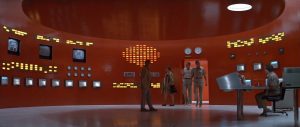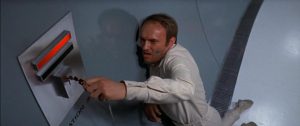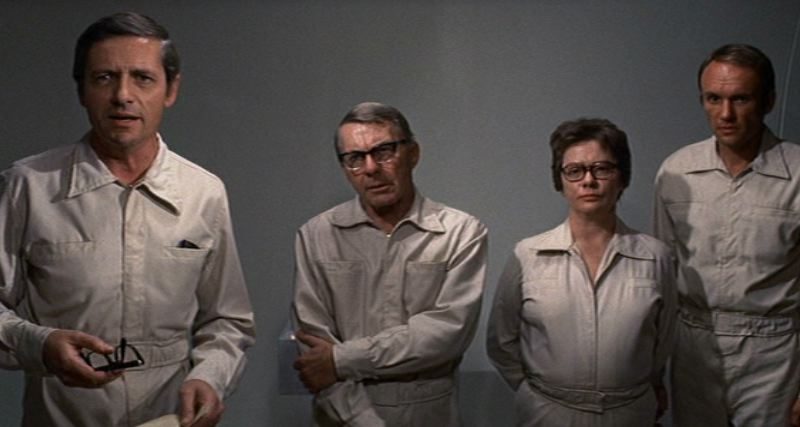Favorite Film Series: The Andromeda Strain (Wise, 1971)
I promised myself I would limit myself to no more than one paragraph about the films I didn’t pick.
While 1971 was not as devoid of more traditional choices as 1970, rifling through the most esteemed and popular films of that year did little to change my impression that this period’s films have not worn well. There is a crude excess to their depiction of violence that is perhaps less intrinsically offensive than some of the desensitizing hyper-violence of the 90s and beyond but which nevertheless feels gratuitous, as though filmmakers have been freed from some restraints and are overcompensating, if not outright reveling. Kubrick’s A Clockwork Orange is at least about the violence it depicts, though as time goes by, it looks less and less like a cautionary tale and more like an excuse to shock the senses. The Academy Award winner, The French Connection, seems happy enough to have Popeye Doyle bandy about the N-word to show he (and it) is gritty. With each passing year, Dirty Harry feels less like a guilty pleasure and more like a former pleasure I feel guilty about. Klute and McCabe & Mrs. Miller are both decent films that also remind me of the paucity of good roles for women in this time period who don’t want to play prostitutes.
Within such a context, Robert Wise’s The Andromeda Strain stands out less for how much of an impression it made on me at the time and more for how well it stood up when I revisited it. Based on a novel by Michael Crichton (more on that in a second), it is audaciously uncinematic. Its drama comes from its ideas rather than external, visceral thrills, and it trusts the audience to follow along through long stretches of scientists looking at screens and talking about lab results.
 The Andromeda Strain was written (and adapted to film) two decades before Steven Spielberg’s Jurassic Park pushed the already successful novelist into the stratosphere. Consequently, it is a reminder that Crichton wasn’t so much the future foreteller as the chronicler of science possible. He wasn’t a world-builder; he was a world-describer. Sure, like almost every other thriller in the history of film, Andromeda eventually gives way to a “push-that-button-before-the-timer-reaches-zero” climax, but at least time is taken to explain why that button is there and why the obstacles are present in the maze the hero must navigate to push it. When the scientists descend into their quarantined bunker, the layout is cheerfully and lovingly detailed. (Wise directed the first Star Trek movie, and I was reminded of long panning shots over the Enterprise.) Also typical of a Crichton narrative, we see how safeguards and procedures are derailed by random, mundane events. A piece of paper slipping between a bell and a hammer isn’t quite as mysterious as the “life will find a way” mysticisms of Jurassic Park. It’s more a reminder of the cautionary aspects of films like Fail Safe and War Games — man’s biggest hubris is not the pursuit of forbidden knowledge but his certainty that he can and will control the effects of the products of that knowledge.
The Andromeda Strain was written (and adapted to film) two decades before Steven Spielberg’s Jurassic Park pushed the already successful novelist into the stratosphere. Consequently, it is a reminder that Crichton wasn’t so much the future foreteller as the chronicler of science possible. He wasn’t a world-builder; he was a world-describer. Sure, like almost every other thriller in the history of film, Andromeda eventually gives way to a “push-that-button-before-the-timer-reaches-zero” climax, but at least time is taken to explain why that button is there and why the obstacles are present in the maze the hero must navigate to push it. When the scientists descend into their quarantined bunker, the layout is cheerfully and lovingly detailed. (Wise directed the first Star Trek movie, and I was reminded of long panning shots over the Enterprise.) Also typical of a Crichton narrative, we see how safeguards and procedures are derailed by random, mundane events. A piece of paper slipping between a bell and a hammer isn’t quite as mysterious as the “life will find a way” mysticisms of Jurassic Park. It’s more a reminder of the cautionary aspects of films like Fail Safe and War Games — man’s biggest hubris is not the pursuit of forbidden knowledge but his certainty that he can and will control the effects of the products of that knowledge.
It is often the framing and marginalia of Crichton’s stories that make them memorable: the notion that an unmarried man would be more likely to blow up the world, the notion that a scientist might hide her epilepsy lest her colleagues stigmatize her. These, as much as the quality of the special effects and computer graphics, are reminders that we are in another time. They are also important reminders of how quickly things can change.
But the biggest difference I see between this movie and modern iterations of the same formula is one of pace. It’s hard to know when, exactly, movies abandoned the tried and true formula of prolonged set up leading to a frenetic conclusion. I want to blame the success of Raiders of the Lost Ark for incentivizing the pushing of set pieces to earlier in the film, but that was more a homage to cliffhanger serials than it was a truly meaningful reshaping of narrative structure. Mission: Impossible 2 famously planned the set pieces before even writing the story. Once that happened, it certainly felt to me like those action sequences grew longer and the narrative bridges that connected them grew shorter. I suppose Michael Bay’s Transformers: Dark of the Moon was my own personal tipping point.
 Well, there I go again, talking about the films I don’t like or the negative ways in which movies have changed rather than about the things I enjoy in the films I admire. It’s worth including a concession that of my choices for favorite films from each year of my life, this is probably the most eclectic. The Andromeda Strain has a barely fresh 62% rating at Rotten Tomatoes, with five of the six “Top Critics” giving it a negative review. It is one of those movies that audiences liked more consistently than critics, so it is not surprising that only the great populist, Roger Ebert, among those Top Critics, worked his way to a thumb’s up. Though he spends a good portion of his review comparing the film unfavorably to 2001: A Space Odyssey, he gives the film more credit than most for illustrating the tensions present in modern conceptions of science.
Well, there I go again, talking about the films I don’t like or the negative ways in which movies have changed rather than about the things I enjoy in the films I admire. It’s worth including a concession that of my choices for favorite films from each year of my life, this is probably the most eclectic. The Andromeda Strain has a barely fresh 62% rating at Rotten Tomatoes, with five of the six “Top Critics” giving it a negative review. It is one of those movies that audiences liked more consistently than critics, so it is not surprising that only the great populist, Roger Ebert, among those Top Critics, worked his way to a thumb’s up. Though he spends a good portion of his review comparing the film unfavorably to 2001: A Space Odyssey, he gives the film more credit than most for illustrating the tensions present in modern conceptions of science.
At its best, science can be about exploration, discovery, and problem-solving. Too often it can become the rigid implementation of principles or decisions made by power or dictated by inherited assumptions. The scientists in The Andromeda Strain expect themselves (and are expected by others) to act like machines. In addition to the aforementioned assumption that a single male could be devoid of emotions when it comes to making decisions that might result in the deaths of others, there is also the recurring testing of stamina and concentration through the absences of sleep. Yet humans are more than thinking machines. It is refreshing to see a film from our past not only acknowledge that but to do so in a narrative context where that fact is still seen as something good and to be celebrated.
Thirty years after The Andromeda Strain, Crichton would publish Prey, a novel about nanobots that explores artificial intelligence as a systemic, existential threat to humanity. I found Prey the more depressing of the two. Crichton’s earlier novel feels like a warning as old as Frankenstein: don’t think you can manipulate what you don’t yet understand without there being unintended consequences. The latter feels like more like a Cassandraish lament that our destruction is not just foreseeable but imminent. Perhaps it is, but I still prefer Andromeda’s somewhat naive optimism that science can or will hold itself apart from the dangerous decisions of our political, economic, and industrial institutions and its perhaps even more naive faith that the agents of those institutions might heed those warnings and learn from nearly-averted calamities.
—
P.S. Although not particularly relevant to this review, it is a historical curiosity that The Andromeda Strain is rated “G” despite the depiction of a nude female corpse. Today, that would, I think, result in an automatic “PG” even though it is not in a sexual context.

